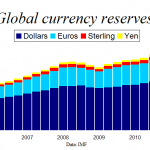The U.S. is in such dire financial shape that it must raise taxes on the middle class as well as the rich AND curtail, via means-testing, giant entitlement programs, including Social Security and Medicare. That’s the Easter Sunday sermon from supply-side guru and former OMB director David A. Stockman via [continue reading . . . ]
Will the bond market tank when the Fed stops buying Treasury paper in a few weeks? As reported in today’s Wall Street Journal, two of the biggest players in the fixed-income market are at polar opposites. They both can’t be right. As I told a friend today, this is why [continue reading . . . ]

Is the dollar’s long run as the global reserve currency coming to an end? It is if the Chinese have anything to say about it. China owns the globe’s largest store of dollar-denominated assets outside the U.S. Understandably, it wants to diversify. The world needs an “international reserve currency that [continue reading . . . ]
Richard W. Stevenson writes in Sunday’s New York Times Week in Review section that the debate in Washington over spending, debt, deficits and entitlements amounts to the most fundamental reassessment of the size and role of government since Ronald Reagan and perhaps since Franklin Roosevelt. Here’s an excerpt: The battle [continue reading . . . ]
Anyone who thinks health-care costs can be brought under control ought to be required to read British physician Theodore Dalrymple’s* piece in the Wall Street Journal issue dated April 16. Here’s an excerpt: The British system is now capable of absorbing infinite amounts of money with minimal benefit to the [continue reading . . . ]
Health care in general and Medicare and the Rx drug benefit in particular constitute the asteroid that threatens our financial extinction. Social Security was technically in surplus — taking in more in taxes than its outgo in benefits — until the recent economic unpleasantness. Social Security might attain surpluses again if [continue reading . . . ]
from Harvard professor Kenneth Rogoff in the Financial Times, April 5, p. 13 Even if today’s government bonds seem pristine by the standards of pre-revolutionary France, future scholars will see our tax systems as Byzantine labyrinths funnelling money to powerful interests, creating staggering inefficiencies. They will surely be incredulous to [continue reading . . . ]